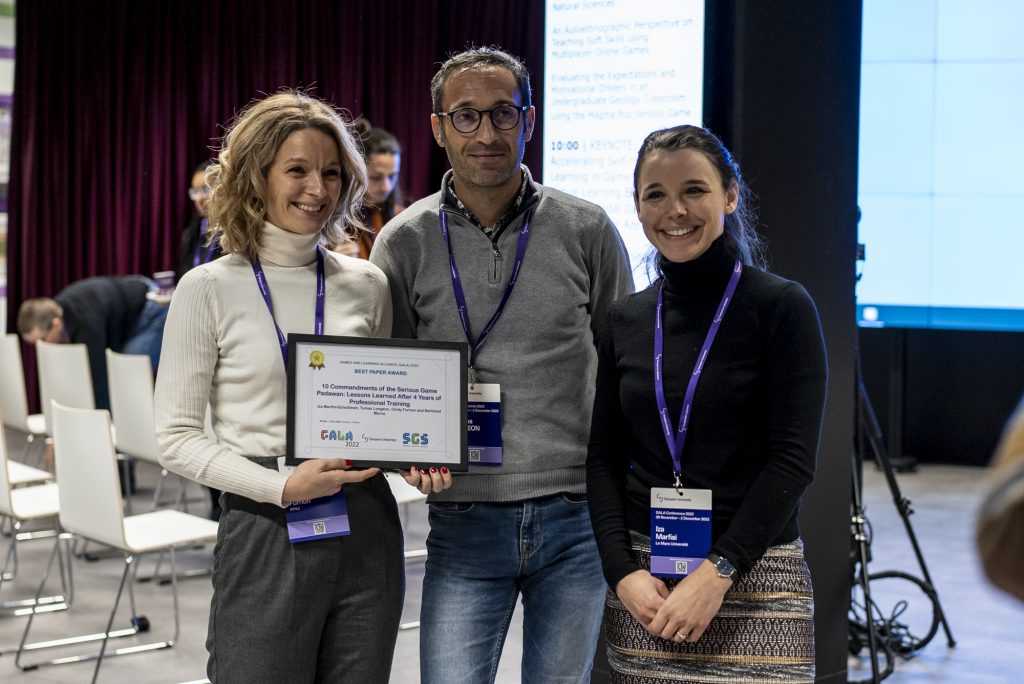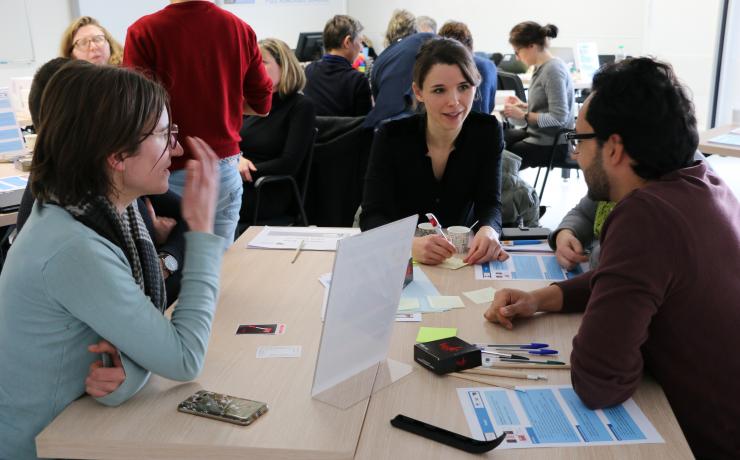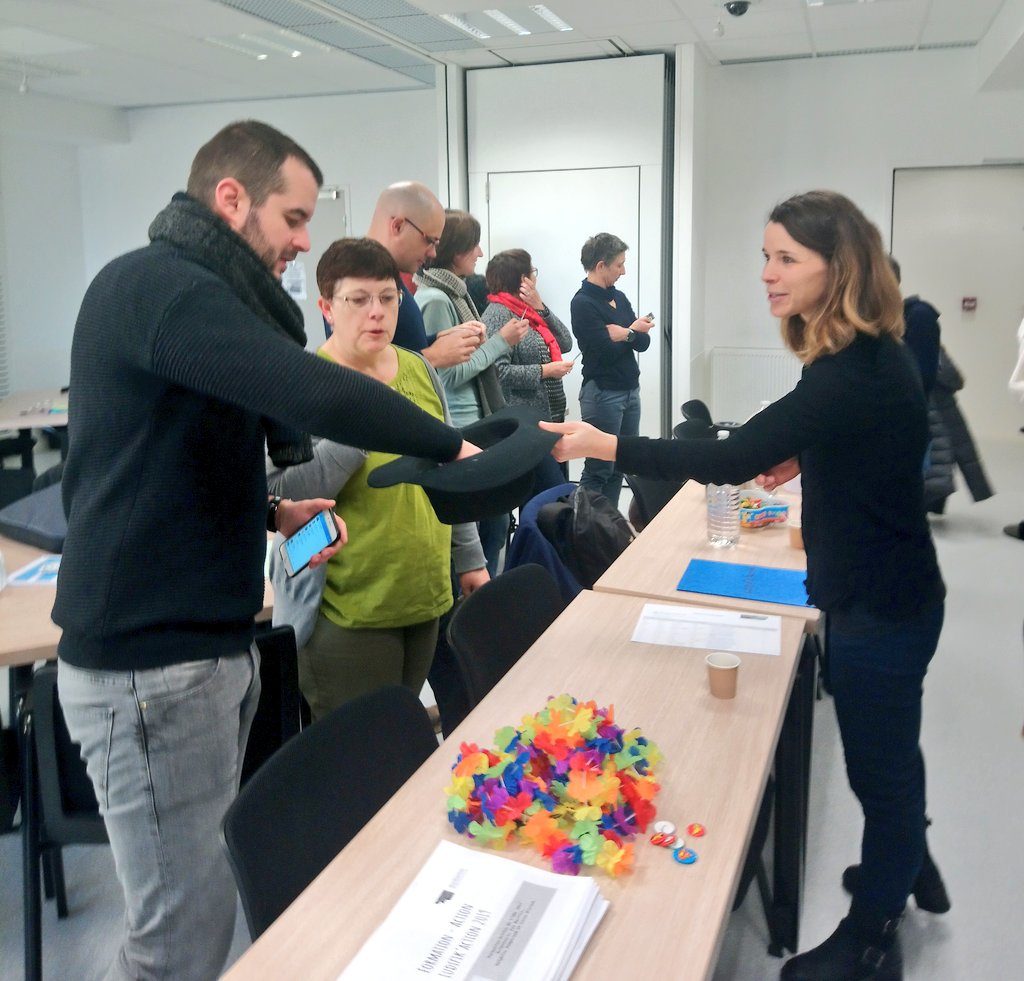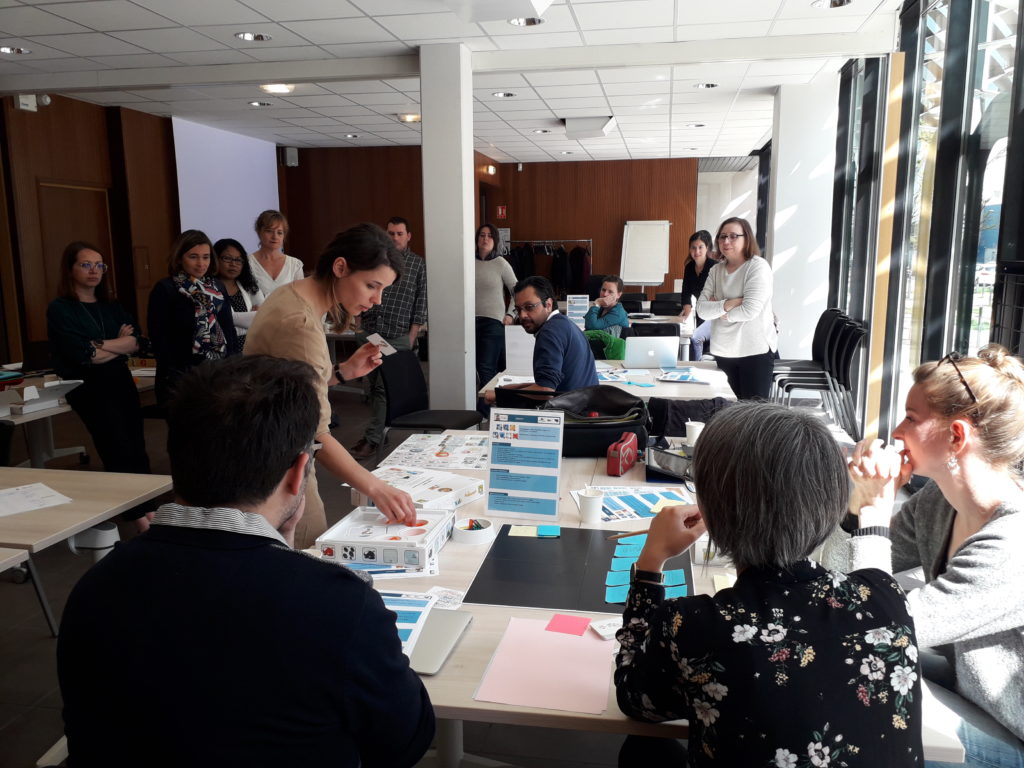Helping teachers create custom Learning Games for their courses (Ludifik’action)
Date: 01/2017 - 01/2027
Funding: Autres
Call: financement prix PEPS 2018
Partners: UBLURL: https://lium.univ-lemans.fr/wp-content/uploads/2023/07/Fiche-Formation_Ludifik-action_10-07-2023.pdf
LIUM Participant(s): |  Iza Marfisi Iza Marfisi |  Sébastien George Sébastien George |  Bertrand Marne Bertrand Marne |
Ludifik’action professional training course given by the LIUM researchers
The use of Learning Games (Serious Games) has never been higher. In parallel to popular digital Learning Games, which show great results for learning, but are very costly and time consuming to develop, we propose a simpler solution to help teachers create custom Learning Games for their courses. The objective is to educate teachers about what a game is made of and the way they can be used effectively for learning in various educational contexts.
The ambition of this annual professional training course is to accompany teachers in the creating of a custom Learning Game for their specific educational objectives.
It has already accompanied the creation of more than 35 serious games (digital and non-digital), curretly used in all of France. The list is on the french version of this page.
Awards and Distinctions
 In 2022, we published a paper about the lessons learners during our traning session at the Games and Learning Alliance internarional conference. The paper was written and presented with two former trainees.
In 2022, we published a paper about the lessons learners during our traning session at the Games and Learning Alliance internarional conference. The paper was written and presented with two former trainees.
The scientific article won the Best Paper Award of the conference!
10 Commandments of the Serious Game Padawan: Lessons Learned After 4 Years of Professional Training
Iza Marfisi-Schottman, Longeon Tomas, Furnon Cindy, Marne Bertrand

In 2018, this course was awarded with the national PEPS 2018 prize, and a 10K grant.
Public:
Trainers, teachers, pedagogical engineers
Prerequisites:
To have taught children, students or adults (professional training), whatever the level or the content of the course.
Format:
- Le Mans University offers a complete training session on an entire semester.
- Other formats are possible on demand: introductory seminar of a few hours, one-day course, workshops for specific needs of a company or school…
Pedagogical Objectives
At the end of the course, the trainee will be capable of:
- Identifying the principal technics to add game mechanics in an educational situation.
- Modifying (modding) a tabletop game in order to integrate learning objectives.
- Defending their choice of game mechanics given the desired learning outcomes.
- Designing a Learning Game, which meets their personal learning objectives and education context.
- Editing a first Learning Game prototype: infographics, pawns, dice, cards, board, box, booklet for the game rules…
- Using the designed Leaning Game in the real educational context with children, students or adults.
- Writing a guide, for other teachers, to explain how the Learning Game can be integrated into a course.
- Writing an article, for colleagues and senior teachers of their school, that will inform them of their new pedagogical initiative and convince them that the proposed Learning Games is enhancing the learning outcome.

Content
Number of hours:
- 12 hours of group practical sessions
- 1 hour of face-to-face meeting with the trainee
- 30 minutes of online tutoring
- Approximately 6 days of work in autonomy
Organization:
Kick-off day (6 hours)
- 30 minutes’ introduction on Learning Games
- 30 minutes’ presentation of examples of Learning Games used in companies, school and universities
- 1.5 hours of modding tabletop games to add learning objectives
- 30 minutes of debriefing session
- Lunch break
- 2 hours of Learning Game design: the trainees work on ideas of Learning Games for the course that they teach
- 30 minutes’ presentation of services that can facilitate the creation of Learning Games: fablab, reprography, university pedagogical services, pedagogical grants…
- 30 minutes of summary: each group present the idea they have come up with for their Learning Games, followed by an open discussion
Work in autonomy (6 days + 30 minutes tutoring + 1 hours meeting)
- Creating the Learning Game prototype and testing it (2 days)
- Face-to-face meeting with the teacher at the trainee’s teaching site (1 hour)
- Improving the Learning Game (1 day)
- Working on the look and feel of the game and editing the game material (1 day)
- Testing the Learning Game with students (1 day)
- Writing the teachers’ guide and the article (1 day)
Final day (6 hours)
- 2.5 hours of presentation of the Learning Games designing during the training course: each group describes their game, the difficulties encountered and the work that still needs to be done.
- Lunch break
- 3 hours of testing the Learning Games and suggesting improvements
Pedagogical methods and tools

The trainees need to sign up as a team with one pedagogical project. The team can be composed of two teachers but the ideal situation is to have one teacher and one pedagogical engineer that come from the same company or establishment. Even if this seems like a constraint, the constitution of this team is essential to facilitate the design and the adoption of a new pedagogical initiative, but also to have more weight against various forms of resistance.
The engagement of the trainees is essential, since the objective of this professional training is to accompany them in the creation of a custom games, designed to fit their specific needs. This course therefore cannot function if the trainees do not have a specific course to work on and if they are not willing to change the way they teach it.
The course is, itself, gamified. The use of game mechanics allows to create a relaxed and friendly atmosphere, that is necessary for the co-design of Learning Games. In addition, it allows the trainees to experience the use of various types of games for teaching and to get a feel for their advantages and disadvantages.
All along the course, the trainees are provided with theoretical guidelines and methods that they use during the practical training sessions. It will allow them to understand the process of integrating game mechanics to enhance a course and, on a long-term, develop their own expertise to help other teachers that want to try Learning Games.
The trainees have access to an online UMTICE course platform with all the resources. This platform is also used to answer questionnaires on game mechanics and deposit their final productions (game mock-up model, teachers guide, article). A large collection of tabletop games will also be at their disposal for inspiration.
Course Validation

The course will be validated depending on the participation of the trainee and the quality off their productions (Learning Game, teacher’s guide and article), but also depending on the effective integration of the Learning Game in their course.
This is the list of the elements that are taken into account for the trainee’s certification:
- Participation to the kick-off day
- Results of the online questionnaire on game mechanics
- Quality of the designed Learning Game (look and feel, learning content and choice of game mechanics)
- Quality of the teacher’s guide
- Quality of the article
- Use of the Learning Game in class (tests with colleagues, with a small group, with the entire class…)
Pedagogical Supervisor :
Iza Marfisi, researcher, Computer Science Laboratory of Le Mans University (LIUM), IUT de Laval, University du Mans

 Français
Français